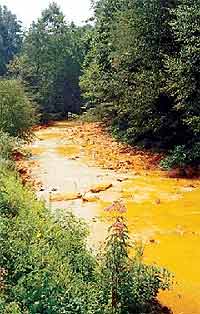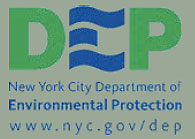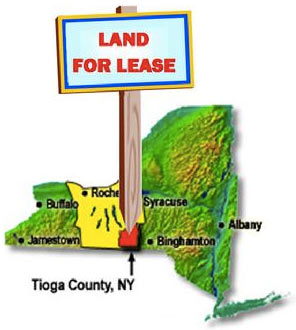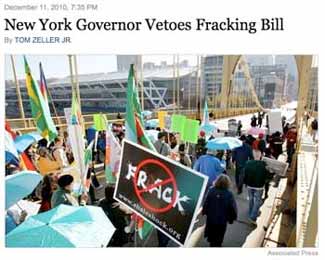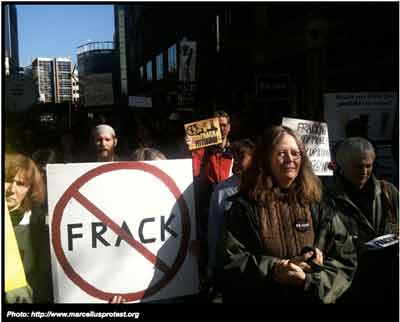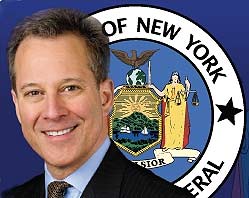Biblio
The National Energy Technology Laboratory (NETL). Website: U.S. National Energy Policy Key Issues & Mandates, Secure & Reliable Energy Supplies.
See: Energy Policy Act of 2005.
"How much of our fossil energy will come from domestic rather than imported sources?
Can we realize the benefits of fossil energy while meeting environmental goals and controlling global climate change?
Can our energy infrastructure reliably deliver energy to the marketplace in the future?
Recent focus on U.S. energy price, availability, and security has resulted in publication of a number of studies and proposals for legislative action. Click here to read more about this issue."
More than a dozen families in Susquehanna County, Pa., filed a lawsuit late Tuesday against the Southwestern Energy Production Company, asserting that a succession of “releases, spills and discharges of combustible gases, hazardous chemicals and industrial wastes” from the company’s nearby drilling sites had contaminated their drinking water and made them sick.
In simpler terms, it’s the latest salvo against hydraulic fracturing — a long-used and highly contentious drilling technique that has come under more intense scrutiny as energy prospectors descend on newly accessible gas deposits under vast areas of Pennsylvania, West Virginia, Ohio and New York.
It’s not the first such lawsuit, and it comes amid a flurry of other legal, regulatory and political maneuvering around the topic at the local, state and federal levels...
...A draft of the most recent lawsuit was provided by the law firm representing the Susquehanna residents.
Energy companies believe they can more than triple the production of tar sands oil, but one of the main constraints is delivery: unless the tar sands fields are linked by pipeline to more markets, there is a limit to how much they can grow.
That barrier could soon be removed. The United States is already the biggest consumer of tar sands oil, and to expand the supply, companies have decided to build a new $7 billion pipeline that will stretch 2,000 miles from Alberta to Texas. We need to resist the siren call of a pipeline that will prove dangerous to our health and environment.
Decisions about pipelines rarely attract a lot of attention, yet they should, because they open up lands for gas and oil development. And every time we expand our fossil fuel infrastructure, we lock ourselves into a string of costly and potentially dangerous consequences...
See: Senator Mike Johanns. "Keystone XL Pipeline - Issues"
West Virginians who live near streams polluted by coal mining are more likely to die of cancer, according to a first-of-its kind study published by researchers at West Virginia University and Virginia Tech.
The study provides the first peer-reviewed look at the relationship between the biological health of Appalachian streams and public health of coalfield residents.
See: Ken Ward Jr. "Breaking news: EPA vetoes Spruce Mine permit." Coal Tattoo. Jan. 13, 2011.
See: Mixplex | EPA in the Crosshairs.
See: Lisa P. Jackson, EPA (lisapjackson) on Twitter.
See: Nathaniel P Hitt. U.S. Geological Survey, Eastern Region, Northeast Area, Biology Discipline.
Hitt, Nathaniel P., and Michael Hendryx. “Ecological Integrity of Streams Related to Human Cancer Mortality Rates.” EcoHealth 7, no. 1 (March 2010): 91-104.
See: Nathaniel P Hitt. U.S. Geological Survey, Eastern Region, Northeast Area, Biology Discipline.
New York City Department of Environmental Protection. 12/23/2009. Impact Assessment of Natural Gas Production in the New York City Water Supply Watershed. 24 pages.
See: Bruce Stutz. Mar. 25, 2010. "A Contoversial Drilling Practice Hits Roadblock in New York." Yale University. Environment360
Southern Tier Landowners Coalition, Groups, and Associations. Includes online petition to support natural gas exploration.
"Southern Tier landowners are encouraged to join a Southern Tier Landowners Coalition, Group, or Association to negotiate better gas leases, obtain higher signing bonuses and royalties, and protection of your property and the environment."
The Tioga County Landowners Group was organized in the summer of 2008 for the express purpose to educate ourselves and our members about the mineral right opportunities.
We are an organization of 1600+ families who own 111,000+ acres of land in Tioga County, NY. At this time there are 75,000 acres available for immediate lease with additional acreage that will be available in the near term. A small percentage of our existing population is currently under lease.
We seek a drilling partner who is fair and equitable, will be sensitive to our property, our community, and the environment. In exchange, you will be partnering with a coalition who is ready and willing to work with a responsible drilling partner towards a successful outcome for us all.

Ben Perkus. Photo by Neil Zusman
New York Residents Against Drilling (NYRAD) is a grassroots network of local residents who are concerned about unconventional gas development in New York State.
See the Personal Accounts and Viewpoints pages.
Assembly Speaker Sheldon Silver and Environmental Conservation Committee Chair Robert K. Sweeney announced the passage of legislation (A.11443-B) that would suspend the issuance of new permits for natural gas or oil drilling involving hydraulic fracturing, known as hydrofracking, until May 15, 2011.
"This moratorium will help ensure that the hydrofracking process will only be allowed in New York after a thorough, deliberate and unrushed analysis of the process is complete," said Silver (D-Manhattan). "By preventing the state from issuing new permits to oil and gas companies until further review, we have protected our water supply and served notice to the industry that the health and safety of New Yorkers is our top priority."
Hydraulic fracturing involves pumping water and chemicals under pressure to create fractures in rock containing natural gas or oil. The resulting fractures permit the natural gas or oil to be captured. Concerns have been raised about the potential environmental and health impacts of the chemicals contained in the hydraulic fracturing fluid. Currently, the Environmental Protection Agency is conducting a study to investigate the possible relationships between hydraulic fracturing and drinking water.
"Decisions regarding the safety of our water and air shouldn't be made in haste, but should be the result of careful study and deliberation," said Sweeney. "If the water has been polluted it will be too late. This legislation will remove any 'time pressure' and allow DEC to do its job correctly."
Will Governor Patterson Veto this Bill?
“Even with the tremendous revenues that will come in at this time we’re not going to risk public safety or water quality, which will be the next emerging global problem after the energy shortage,” he told WAMC-FM radio last week. “At this point, I would say that the hydrofracking opponents have raised enough of an argument to thwart us going forward at this time.”
Zeller, Tom. "New York Governor Vetoes Fracking Bill." The New York Times: Greenwire, December 11, 2010.
Gov. David A. Paterson of New York on Saturday vetoed legislation intended to curtail natural gas development using the technique called hydraulic fracturing until a closer review of its effects can be undertaken.
Instead, the governor issued an Executive Order instituting a moratorium that extends until July 1, 2011 — beyond the date specified in the legislation — and that more narrowly defines the types of drilling to be restricted.
“This legislation, which was well intentioned, would have a serious impact on our state if signed into law,” Mr. Paterson said in a prepared statement. “Enacting this legislation would put people out of work – work that is permitted by the Department of Environmental Conservation and causes no demonstrated environmental harm, in order to effectuate a moratorium that is principally symbolic.”
See: Sue Smith-Heavenrich. The Marcellus Effect. December 15, 2010. "No Moratorium And No Horizontal Hydro-Fracking".
Assemblywoman Barbara Lifton explained that an Executive Order, no matter how good, is second best to legislation. A statute, she points out, would not face the risk of being rescinded by Governor Cuomo when he takes office.
“There was also a lot of misinformation from the industry,” Lifton said. Regardless of how safe people insist the current drilling technology is, there are problems with vertical wells. That’s why the moratorium included vertical wells, Lifton said. Indeed, it was vertical Marcellus wells that contaminated the drinking water wells in Dimock, PA.
What does the Executive Order really say? Not much, when you really read it...
See: Sharon Wilson. December 15, 2010. Bluedaze. "The giant loophole NY Gov. Patterson gave industry".
I've kept quiet on the Patterson executive order to hault fracking because something smelled funny about it. Why veto the moratorium then issue an EO? That didn't make sense to me.
The Marcellus Effect blog explains how Patterson is having his cake and eating it.
His giant loophole allows vertical fracking so watch for a big rush on vertical permits. Industry will chop down a bunch of trees and get their vertical pad sites all ready for when the EO expires. Then all they have to do is apply for a change of permit.
There's always a loophole.
See: Energy in Depth. Dec. 2, 2010. "Live From New York…"
See: Sarah Hoye. Dec. 2, 2010. CNN. "New York could be first state to ban controversial drilling practice".
See: Peter Mantius. Dec. 1, 2010. DC Bureau. "New York Assembly Delays Fracking Until May 2011".
Office of the Attorney General, New York State. Eric Schneiderman.
Oil and Gas Leases: Land Owner Rights and Land Owner Tips.
Problems with Landmen
Misleading or Misunderstood Statements
1. “Your property will [or won’t] be in the unit.”
2. “This is the standard lease, and it’s not negotiable”.
3. “All your neighbors have signed, and you’re the sole person holding everything up”.
4. “Don’t you want to receive $X every month”?
5. “If you don’t sign, we’ll take the gas from your property without paying you”.
Feeling Under Pressure? Consider the Following:
1. Obtain the full name, address, and telephone number of both the landman and the business they represent.
2. Direct the landman to leave the property and to not return or contact you again.
See: Jon Campbell. Star-Gazette. Nov. 7, 2010. "Attorney General-elect Schneiderman staunchly opposes hydraulic fracturing."
Eric Schneiderman, a Democrat who handily defeated Republican gas-drilling supporter Dan Donovan on Tuesday, has said he will sue to stop the controversial drilling process of hydraulic fracturing -- until it is proven safe -- and aggressively go after drillers who break the rules."
NYS Water Resources Institute at Cornell
The Mission of the New York State Water Resources Institute (WRI) is to improve the management of water resources in New York State and the nation. As a federally and state mandated institution located at Cornell University, we are uniquely situated to access scientific and technical resources that are relevant to New York State's and the nation's water management needs. We collaborate with regional, state, and national partners to increase awareness of emerging water resources issues and to develop and assess new water management technologies and policies. WRI connects the water research and water management communities.
See Gas Wells: Waste Management of Cuttings, Drilling Fluids, Hydrofrack Water and Produced Water
See MarcellusShaleReport-6-12-08
….Drilling muds that circulate through the well and return to the surface may contain dissolved and suspended contaminants including cadmium, arsenic, and metals such as mercury, copper and lead; hydrocarbons; hydrogen sulfide and natural gas, as well as drilling mud additives, many of which contain potentially harmful chemicals (e.g., chromate, barite).”
February 2010 issue concentrates on major media environmental journalism.
In a memo leaked this summer from the Institute to its members, which its website boasts range from “the largest major oil company to the smallest of independents,” the trade organization’s CEO urged “oil companies to recruit their employees for events that will ‘put a human face on the impacts of unsound energy policy,’
...At the same time as they talk big about going green, the oil barons have waged highly organized disinformation campaigns going back decades to prevent legislative efforts to combat climate change (Mother Jones, 5–6/05). This fall, blogger Zachary Roth (TPMMuckraker, 11/4/09) noted that the American Petroleum Institute “has been a key opponent of serious efforts to address climate change, spending over $3 million lobbying on the Waxman-Markey climate change bill this year.” [The bill was approved by the House of Representatives on June 26, 2009 by a vote of 219-212]
According to the Sourcewatch article on the Bill, Brent Blackwelder, president of Friends of the Earth, praised the efforts by Waxman, Markey, and others to develop global warming legislation, but added that the bill had been "corrupted by members of Congress backed by oil and coal interests."
See: Ken Ward Jr., "Waxman-Markey update: A global warming crossroads?" Coal Tattoo, May 18, 2009.
This article appeared in the June 21, 2010 edition of The Nation.
When a well is fracked—each well is generally fracked up to ten times—between 15 and 40 percent of the mix flows back to the surface. Companies operating in the Marcellus, which is naturally radioactive, must find a way to dispose of thousands of gallons of water, toxic chemicals, brine and radium.
There are several ways things can go wrong, Horwitt says. Fluids can be spilled during transport, they can travel underground through natural or man-made fractures, or they can contaminate nearby areas if they're not stored properly...
Citizen action groups have popped up all over the Marcellus region, including the Shaleshock Action Alliance and the Pennsylvania-based Damascus Citizens for Sustainability, and around the country.
On May 26 As You Sow, a shareholder advocacy organization representing the Park Foundation of Ithaca, won support from a surprising 26 percent of shares at ExxonMobil's annual meeting for a proposal that would have required the company to disclose its efforts to reduce risks from natural gas drilling. "The Gulf oil spill is a powerful example of how oil and gas drilling can devastate the environment," Park Foundation executive director Jon Jensen wrote in a statement. "This is a good first step in responsibly seeking energy in a way that protects the environment, human health, and the welfare of the company."
See: As You Sow | Mixplex
See: Dusty Horwitt. (2009). "Drilling Around the Law Report." Environmental Working Group. 24 pages.
See: Exxon Confronts Nuns, Calpers Over Global Warming Plans, Boskin
Pennsylvania based blog. Includes a quotes page unique to blogs on the environment, highlighting the struggle between citizens, corporations, and government regulations, providing a larger historical context.
It is horrifying that we have to fight our own government to save the environment. ~Ansel Adams
“In the woods we return to reason and faith”
Ralph Waldo Emerson
See: Fracked Dry
Over the next thirty years, given the present technology, 500 billion gallons of water will be retired underground in Pennsylvania through the process known as horizontal fracturing. This is according to email discussions I have had with Penn State’s Marcellus Center for Outreach and Research
500B is equivalent to 68 Harvey’s Lakes, or 263 Huntsville reservoirs, or 200 Wallenpaupacks (a relatively shallower but more expansive body of water).
This water will no longer be available for human use. It will lurk in the shattered caverns below. This dispersed sea will be waiting for a flaw, a break, an errant burst of pressure…
...Recently, EnCana Corporation was given permission to drill three “exploratory” natural gas wells in the Back Mountain, near Herb Baldwin's property.











